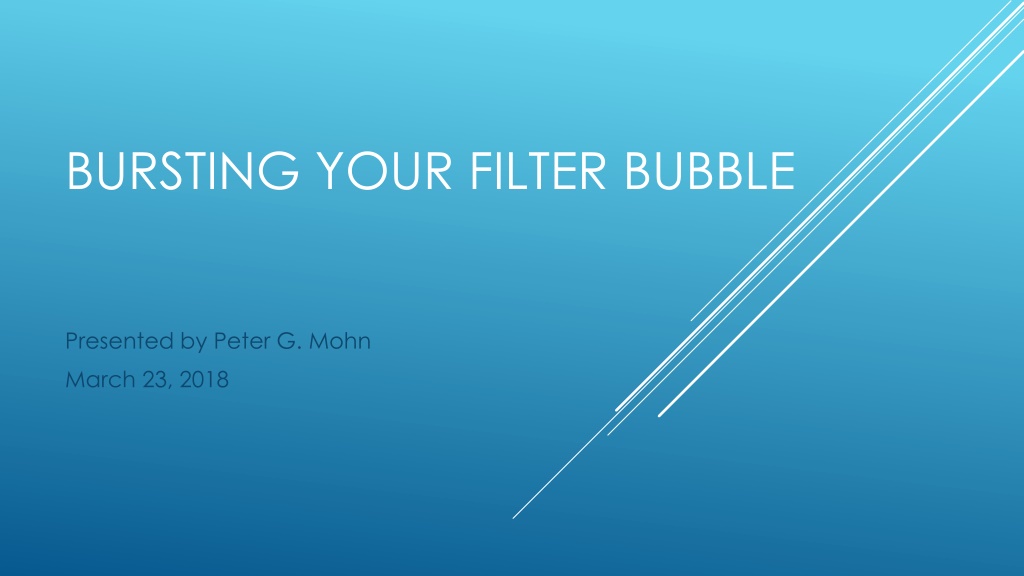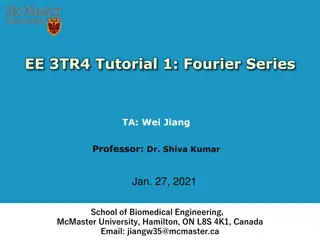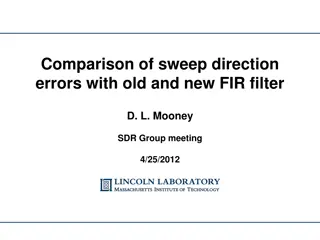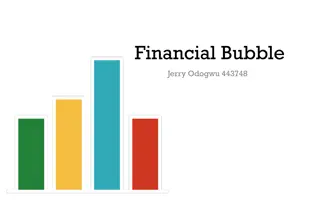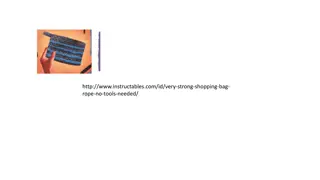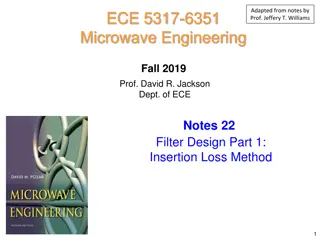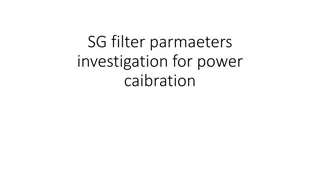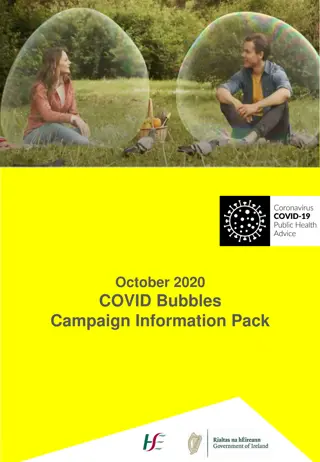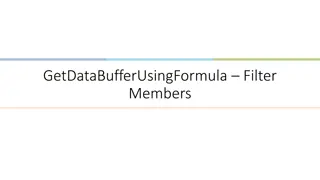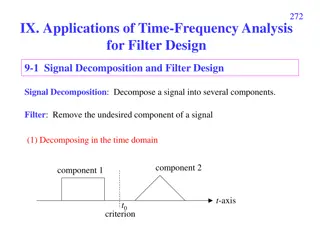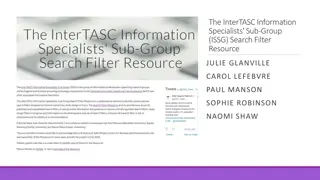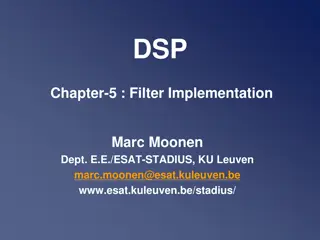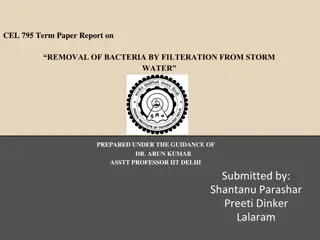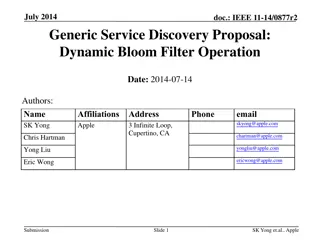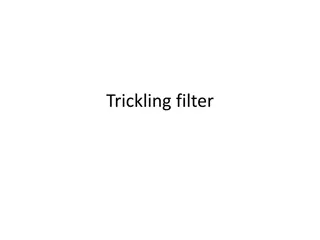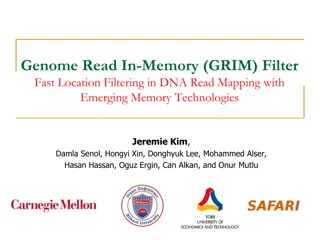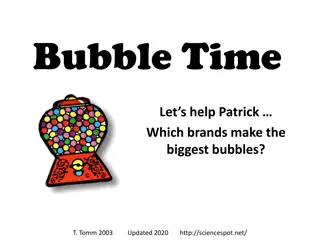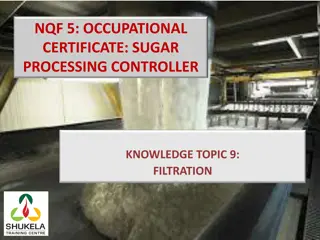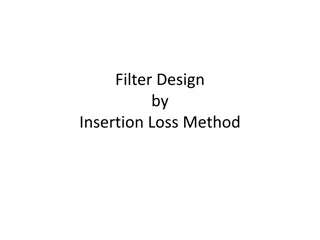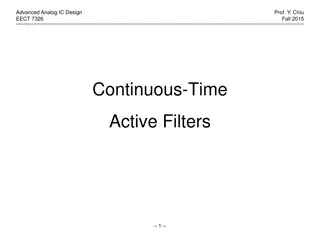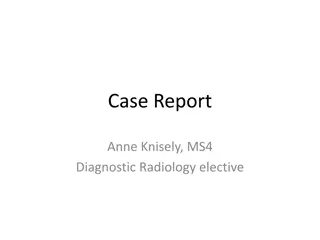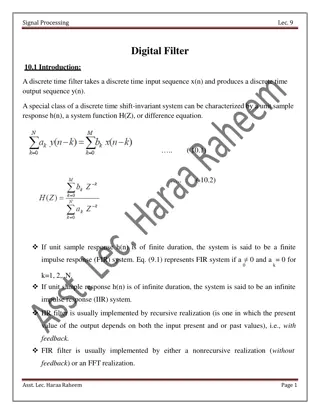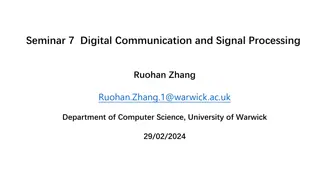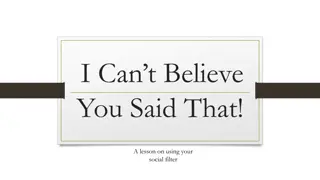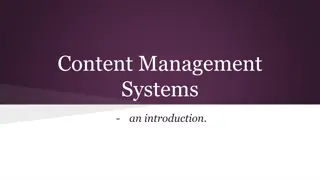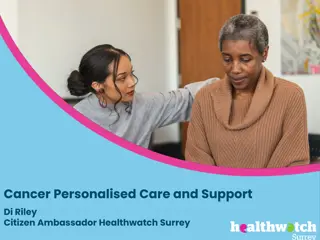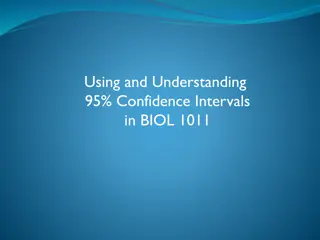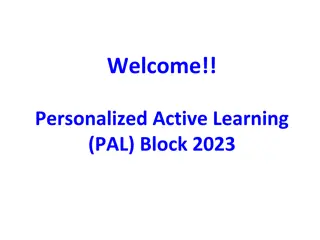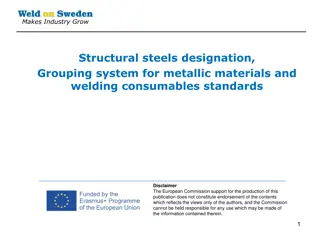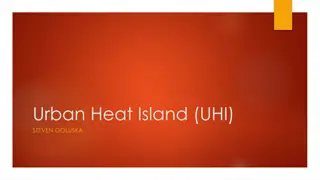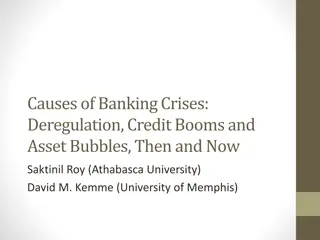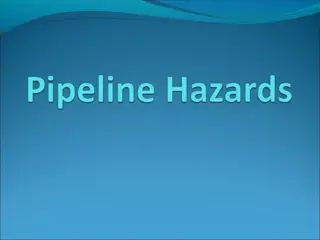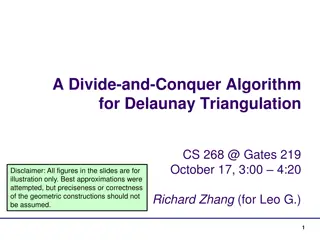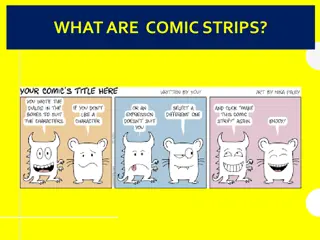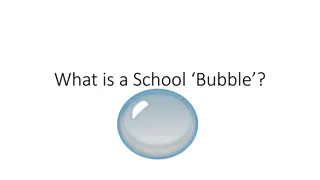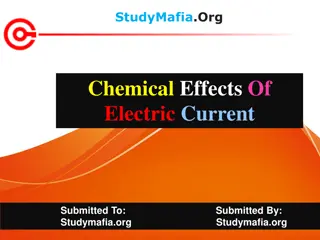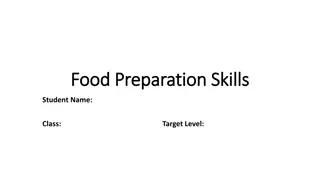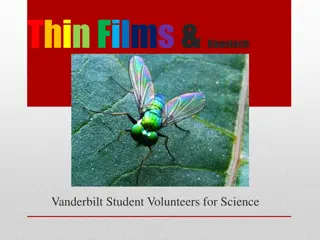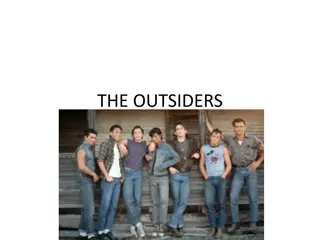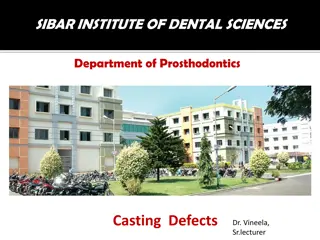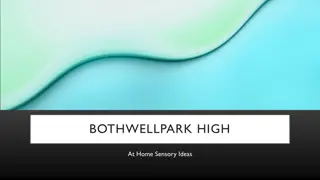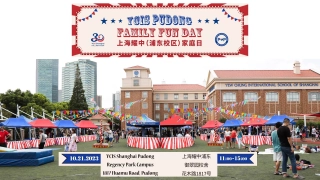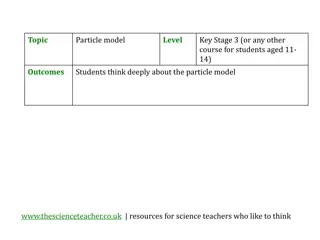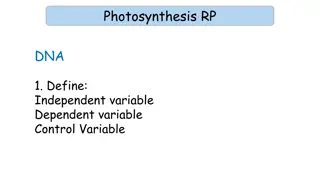Understanding Filter Bubbles and Personalized Content
Explore the concept of filter bubbles, where algorithms shape the information we see online. Learn about Personal Construct Theory and Constructivist Psychology, how they influence our worldview and decision-making. Discover how major companies personalize content and the impact on individual perceptions. Watch Eli Pariser's TED Talk on the dangers of online filter bubbles.
Download Presentation

Please find below an Image/Link to download the presentation.
The content on the website is provided AS IS for your information and personal use only. It may not be sold, licensed, or shared on other websites without obtaining consent from the author. Download presentation by click this link. If you encounter any issues during the download, it is possible that the publisher has removed the file from their server.
E N D
Presentation Transcript
BURSTING YOUR FILTER BUBBLE Presented by Peter G. Mohn March 23, 2018
Developed by American psychologist George Kelly in the 1950s Theory of personality and cognition Each person develops their own schema or ways of seeing the world You build your own concepts of how the world works (reality) Your concepts help you anticipate events When faced with strong contradictions to your world view you either Ignore the facts in front of you, or You change your world view PERSONAL CONSTRUCT THEORY
Based on Bruners and Piagets constructivists psychology background Encourage learners to come to their own conclusions Responsibility of learning resides with the learner Learners need confidence in their own ability to learn or potential to learn Learning is an active process Collaboration between learners is highly encouraged Instructors as facilitators CONSTRUCTIVIST PSYCHOLOGY / LEARNING
Algorithms, like Facebooks decides what information to show you Every time your tailor your feed it changes your filter bubble Friending & unfriending can narrow your filter bubble Your world view maybe skewed by these algorithms 62% of people get news from social media sites Filter bubbles are a design problem Your filter bubble could effect the decisions you make CHARACTERISTICS OF FILTER BUBBLES
https://www.ted.com/talks/eli_pariser_beware_online_filter_bubb les?language=en Photo by Jess Blank/Upworthy, 2016. ELI PARISER S TED TALK
Facebook (see Cambridge Analytica news stories) Yahoo News Twitter Amazon Netflix Pandora Gawker drives traffic by doing whatever they can to hook you with Google personalizes your searches Newspapers are experimenting with algorithms MAJOR COMPANIES THAT CREATE PERSONALIZED CONTENT
DuckDuckGo you customize its interface Yippy for young kids Ixquick calls itself the most private search site BROWSERS THAT DON T TRACK YOU
What Exactly Are We Reading?, v. 3.1 by Vanessa Otero, 2017. NEWS SOURCE BIAS
Brother (Snapchat) screen shot, March 8, 2017 Morning Consult Media Poll OTHER NEWS BIAS CHARTS
1. Stop speculating and start looking 2. Bring curation into journalism 3. Better filter algorithms 4. Don t just filter, map 5. Figure out what you really want FIVE POTENTIAL PATHS
University of Illinois Library Get rid of your search history Turn off targeting ads Delete your browser s cookies Disable tracking cookies Keep your Facebook private, and hide your birthday Go incognito, better yet go anonymous http://guides.library.illinois.edu/c.php?g=348478&p=2347795 HOW TO BURST YOUR BUBBLE
Ted Talk https://ed.ted.com/lessons/how-to-choose-your-news-damon- brown By Damon Brown HOW TO CHOOSE YOUR NEWS
Timeliness Proximity Impact or consequence Novelty or rarity Conflict Human interest Prominence WHAT MAKES THE NEWS
Bandwagon Poisoning the well Hasty generalizations False authority Red herring FAKE NEWS - FALLACIES IN REASONING
Hi from the Other Side Pairing people up from different political sides Who Do You Want to Understand Better Political viewpoints News sent to your Facebook Feed NEWS FROM OPPOSITE THE VIEWPOINT
School Journalism Common Sense Education, grades 9-12 Reading Like a Historian National Council of Teachers of English Media Literacy Lessons Center for Media Literacy NEWS CURRICULUM & LESSONS
Require students to use multiple mediums Use and promote authoritative sources https://www.sno.wednet.edu/Page/2267 Ask students to evaluate their sources as part of the assignment Have students check validity of articles Require students to read sources from different viewpoints http://go.galegroup.com/ps/start.do?p=GVRL&u=snoh11355&authCount=2 Integrate digital literacy skills within class assignments Teach students to write annotative bibliographies CHANGING YOUR STUDENTS SEARCH PATTERNS
Help students identify the intent of what they watch 5 questions to ask about media Customizing videos with EdPuzzle Be aware that the web is a unique beast Wild wild west Fact checking the web Reverse image check on Google Turn active viewing into reactive viewing Active viewing posing questions before viewing Reactive viewing critiquing what you viewed Transform students video critiques into creations MediaBreaker Empower students to become advocates HOW TO READ THE WEB/VIDEOS
Learning to analyze visual media Photographs Cinematography Video & Film Jolts per minute Sesame Street - https://www.youtube.com/watch?v=ID6rza6zOxk NBC News Olympic Athlete feature - https://www.youtube.com/watch?v=Z4hdoI9UM2s Big Bang Theory - https://www.youtube.com/watch?v=DQ5vYia3bqM A Wrinkle in Time trailer - https://www.youtube.com/watch?v=UhZ56rcWwRQ MEDIA LITERACY
Understand Figure Out Decide Build or invent Persuade or convince Challenge or destroy Acquaint Dismiss Wonder Predict CHANGE YOUR RESEARCH QUESTIONS Inquiry research by Jamie McKenzie
Before 1. Go find out about Robert or Elizabeth Browning (or any other poet, general, prime minister, hero, character, celebrity, scoundrel or seer. What did he or she do? After 1. What were the 5 most distinguishing characteristics of Browning and how did they contribute to her success or failure? What made her great or not so great? What are the 2-3 most important things you learned about her that might serve you well? 2. Go find out about the Pacific coast (or any other region, city, town, state, or nation). How long is it? How many people live there? What is its climate? 2. What are the biggest challenges or threats facing the coast? Rank the ten biggest from highest to lowest import and explain why you rank them thus. What should be done about these challenges? 3. What are the chief points of interest in a city like Los Angeles? 3. Which museums, parks, entertainment facilities and points of interest for Los Angeles would actually be interesting and worth a visit? Which could you safely recommend to various people you know with different tastes and interests if you were planning a week long tour? Which are unworthy of a visit? UNDERSTAND RESEARCH QUESTIONS
Before 1. Go find out about Richard Nixon (or Bill Clinton or any other important person). 2. Go find out about free trade. 3. How does Social Security work? After 1. Where did Nixon (or Clinton) go wrong? Why do you suppose he slipped from power and grace? What caused him the most trouble? What could you learn from his example? 2. What are the hidden costs of free trade? What could we do to minimize risks and damage? How could we maximize benefits? 3. How are we going to fund Social Security? FIGURE OUT RESEARCH QUESTIONS
Before 1. Go find out what people have tried to do in order to prevent wars. 2. Go find out about Robert Frost, Emily Dickinson and Adrienne Rich. 3. What do the candidates propose doing about Iraq? After 1. Which approaches to preventing war have had the most success over the years? Why do you suppose this is so? Which have the best prospects for the current century? 2. Which of these poets wrote the most illuminating and evocative works? What traits made their works superior? Which poets and poems may survive this century? 3. Which candidate has the most credible and logical approach to bringing peace, stability and democracy to Iraq? DECIDE RESEARCH QUESTIONS
Before 1. Go find out about acid rain (or some other major challenge facing the nation) After 1. Imagine the governor of your state has asked your team to come up with a plan to reduce the damage being done by acid rain to state forests. After reviewing what has been done in the past, what would be the main thrust of your proposal to restore healthy forests and moderate the impacts of acid rain? How can you improve on past efforts? 2. What did General X do in the Battle of Some Big River? 3. What is your synopsis of the novel Dirt Music by Tim Winton? 2. Taking advantage of 20-20 hindsight, what do you think General X should have done differently during the Battle of Some Big River to reduce casualties and block the enemy from winning the war? Where did the story bog down, falter and disappoint you? What could Winton have done differently, do you suppose, to improve upon those sections? BUILD OR INVENT RESEARCH QUESTIONS
Before 1. What did Marie Curie discover? 2. What are the main treatment choices for depression? 3. What are the campaign planks of the major parties? After 1. If you wanted to nominate Curie as the most influential scientist of her time, how would you support your case? 2. After exploring the treatment choices for your friend's depression, you grow concerned that he/she is being unduly swayed by a charming doctor who is urging a path that might do great damage. What evidence, logic and testimony can you offer that might help him/her achieve a more balanced and healthy perspective? 3. Which party is most likely to address the major challenges of this town, city, state, or nation in the most productive and constructive manner? What makes you think so? Why should I listen to you? PERSUADE OR CONVINCE RESEARCH QUESTIONS
Before 1. What were the events leading up to the beginning of World War Two? 2. What is the current space program for the USA? 3. How was intelligence gathered and assessed prior to the 2016 elections? After 1. What were the chief weaknesses in the foreign policies of France, Britain and the United States vis a vis Germany and Japan prior to World War Two? How could you have improved the policies? 2. Are we on the right track when it comes to funding NASA and the current space exploration program, or should we be making major changes or considering some of the ideas advanced by President Trump? 3. Do we need to modify the gathering and assessment of intelligence? If so, in what ways? CHALLENGE OR DESTROY RESEARCH QUESTIONS
Before 1. What stories has Annie Prouix written? 2. Find out about Osama Bin Laden. 3. Who are the candidates? After 1. How have Annie Prouix's stories changed since she moved to Wyoming? Was this a good change? Where do you hope she might move next? 2. What were Bin Laden's chief weaknesses, his major vulnerabilities, his obsessions and the patterns which led to his downfall and death? 3. What has this candidate done about the major issues of the day? Has he or she served me well? What are the chances he/she will serve me well in the future? ACQUAINT RESEARCH QUESTIONS
Before 1. Go find out about Jack London, the author. After 1. To what extent was Jack London a fraud? How did his public image, his fiction, his theories about the good life and his actual life conflict? Why did he die young? 2. What is our policy on jobs? 3. What were George Bernard Shaw's main criticisms of his society? 2. What is going wrong on the job front? 3. When was Shaw off base and lacking in judgment? DISMISS RESEARCH QUESTIONS
Before 1. How did our nation's European explorers treat indigenous people they encountered? 2. What are we doing about Alzheimer's Disease? 3. What is meant by "checks and balances?" After 1. What could we have done differently and how would that have changed the society that we are now? 2. What is the best we could do about Alzheimer's Disease? Are we caught up or blinded in some ways to potential solutions? Why does Alzheimer's Disease seem to be on the increase? Are we paying the price for some terrible environmental faux pas or for chemicals in our diet? 3. When have "checks and balances" failed to operate? How and why might such systems break down? How can we avoid disappointments? WONDER RESEARCH QUESTIONS
Before 1. What are the cultural preferences of those living in nations such as Iran, Iraq, Syria and Saudi Arabia? 2. What went wrong during the Great Depression? 3. Which scientific laws or principles have proven to be unreliable or inadequate as we have extended and deepened the range of scientific understandings? After 1. How does culture influence the development of democratic norms? What would it take to create a healthy and stable democratic government in nations such as Iran, Iraq, Syria and Saudi Arabia? 2. Could something like the Great Depression ever happen again? 3. Which scientific laws currently held to be true are most likely to shift during the next decade? Which are least truth worthy? If we can't trust science, then how do we know what to do? PREDICT QUESTIONS
Berger, Molly. February 2018. Media Literacy Ideas You Can Use on Monday. NCCE Conference 2018.Web. https://pdf.snapandread.com/viewer.html?url=https%3A%2F%2Fconf erence.ncce.org%2Fuploads%2FNCCE2018%2FHANDOUTS%2FKEY_14 394797%2FMedialiteracyideasyoucanuseonMonday2.pdf . Lester, Heather. February 2018. Fake News Hack Research. NCCE Conference 2018. Web. https://raindrop.io/collection/2186989 . McKenzie, Jamie. February 2007. Putting an end to topical research. For Now On. Web. http://fno.org/feb07/topic.html . Mohn, Peter. March 2018. Mr. Mohn s Literacy Corner. Glacier Peak High School s Library Media Center. Web. https://www.sno.wednet.edu/Page/2409 . REFERENCES
